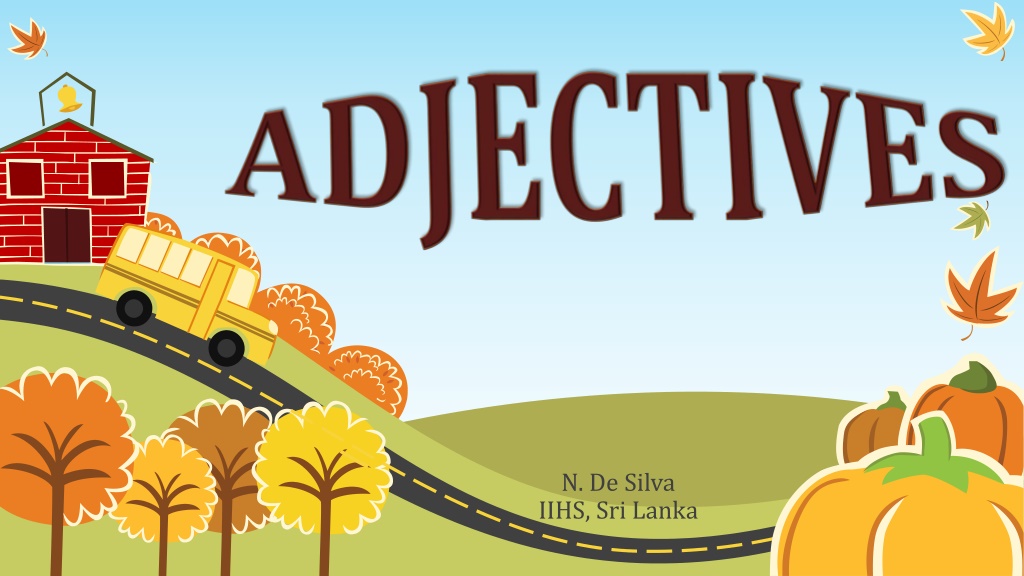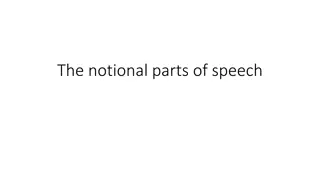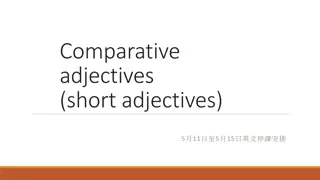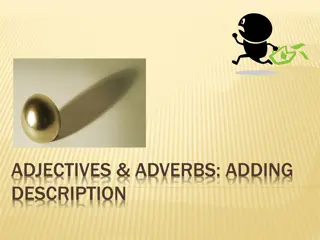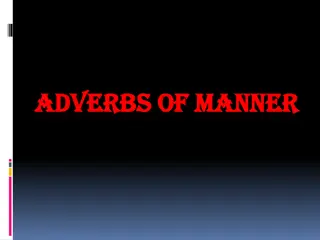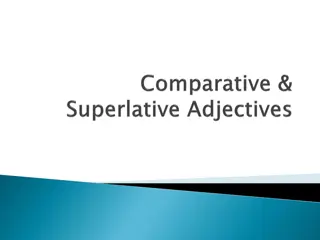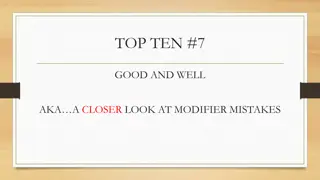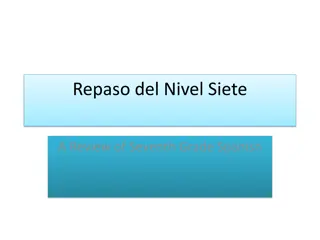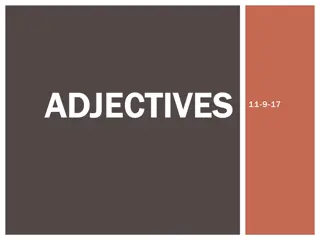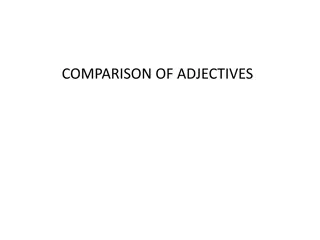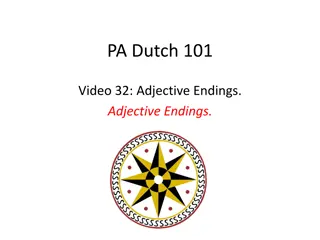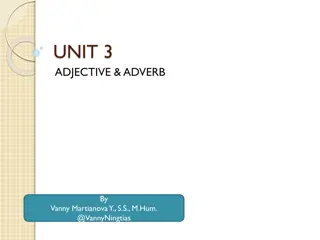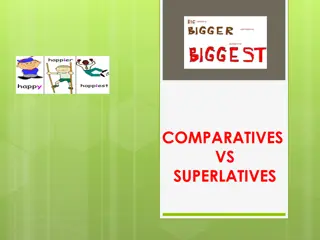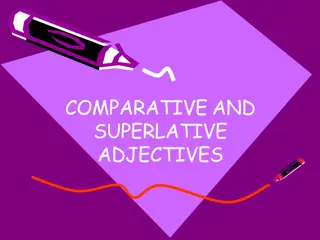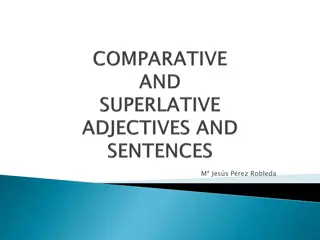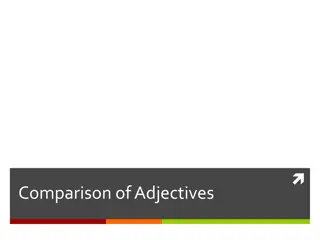Understanding Adjectives: Types and Placement Order Explained
Learn about adjectives, words that describe nouns, including types like descriptive and limiting adjectives. Understand their placement order in sentences and examples of how they enhance the meaning of nouns.
Download Presentation

Please find below an Image/Link to download the presentation.
The content on the website is provided AS IS for your information and personal use only. It may not be sold, licensed, or shared on other websites without obtaining consent from the author. Download presentation by click this link. If you encounter any issues during the download, it is possible that the publisher has removed the file from their server.
E N D
Presentation Transcript
N. De Silva IIHS, Sri Lanka
An adjective is a word that describes a noun. It is used to add something to the meaning of the noun. Simply put, an adjective describes or modifies a noun. It provides further information about a noun, indicating things like size, shape, color, and more. Nice Single storey Big Brown Beautiful Library
Adjectives are information gatherers. Specifically, adjectives provide further information about an object's size, shape, age, color, origin or material... o It's a big table. (size) o It's a round table. (shape) o It's an old table. (age) o It's a brown table. (colour) o It's an English table. (origin) o It's a wooden table. (material) o It's a lovely table. (opinion) o It's a broken table. (observation) o It's a coffee table. (purpose)
How to place Adjectives in order? Opinion Determiner a/an/the/these/that Size Great/terrible/pretty/l ovely/silly Huge/big/small/tiny Age Shape Colour Ancient/new/young/ old Round/flat/square Black/red/white/reddish Origin Material Purpose British/Italian/Sri Lankan Wooden/paper/glass/ silver Writing/cooking/washing
Descriptive Adjectives Descriptive adjectives describe quality of the noun Descriptive adjectives can be attributive adjectives or predicate adjectives. Attributive Adjectives Adjectives which appear directly beside the noun, most commonly before, are called attributive, because they attribute a quality to the noun they modify. Example: The flowers have a nice smell. ( Nice is an attributive adjective, as it is placed). Predicate Adjectives Adjectives which appear after a linking verb are predicative adjectives, because they form part of the predicate. Hence, they modify the subject of the sentence or clause (a clause is a portion of a sentence which contains a subject and a predicate). Example: The pickles are salty. (noun: pickle, linking verb: are, adjective: salty (describing the noun pickles )
Limiting Adjectives Limit the noun being described. Definite & Indefinite Articles (The/ a/ an) Possessive Adjectives (my, your, his, her, its, our, their = shows the ownership) Demonstrative Adjectives (this, these, that, those, what) Indefinite Adjectives (which/what) Interrogative Adjectives (many/any/few/all) Cardinal Adjectives (numbering it - stating how many five/ten) Ordinal Adjectives (position first/last) Proper Adjectives (capitalized proper nouns Chinese/British) Nouns used as Adjectives (A history class/ The computer lab) For description = https://7esl.com/types-of-adjectives/
IN-DEPTH KNOWLEDGE 1. Descriptive Adjectives The descriptive adjectives can be simply defined as the type of adjectives that are used to express the size, color, or shape of a person, a thing, an animal, or a place. They are used to provide more information to a noun by describing or modifying it. Descriptive adjectives usually express things that are observable through the five senses (touch, taste, sight, smell, and sound). 1.1 Attributive Adjectives an attributive adjective is an adjective that usually comes before the noun it modifies without a linking verb. Attributive adjectives are direct modifiers of nominals. (e.g. a black cat) 1.2 Predicate Adjectives Used after a verb such as be, become, grow, look, or seem, they re called predicative. (e.g. the cat was black)
2. Limiting Adjectives A limiting adjective defines the noun rather than describes it. Most of the time we think of adjectives as describing or adding detail to a noun. Limiting adjectives help to limit a noun. They can point out a specific object (the cat, this house, my car) or set a numerical limit to it (two dogs, the third book). Collins English Dictionary defines a limiting adjective as one of a small group of adjectives that modify the nouns to which they are applied by restricting rather than describing or qualifying. 2.1 Definite and Indefinite Articles In English there are three articles: a, an, and the. Articles are used before nouns or noun equivalents and are a type of adjective. The definite article (the) is used before a noun to indicate that the identity of the noun is known to the reader. The indefinite article (a, an) is used before a noun that is general or when its identity is not known. There are certain situations in which a noun takes no article.
2.2 Possessive Adjectives The possessive adjectives are my, your, his, her, its, our, their, and whose. A possessive adjective sits before a noun (or a pronoun) to show who or what owns it. Since the 1960s, possessive adjectives are increasingly called "possessive determiners." Both terms are still in common use. "Possessive adjective" is currently about twice as popular as "possessive determiner. 2.3 Demonstrative Adjectives Demonstrative adjectives are special adjectives or determiners used to identify or express the relative position of a noun in time or space. A demonstrative adjective comes before all other adjectives in the noun phrase. Some common demonstrative adjectives are this, that, these, and those.
2.4 Indefinite Adjectives An indefinite adjective is an adjective used to describe a noun in a non-specific sense. The most common indefinite adjectives are any, each, few, many, much, most, several, and some. Indefinite adjective are classified as "quantifiers" (a type of determiner) in contemporary grammar. Indefinite adjectives are often used to describe a noun to show an element of uncertainty. NOTE: Do Not Confuse Indefinite Adjectives with Indefinite Pronouns Indefinite adjectives should not be confused with indefinite pronouns, which stand alone (i.e., they do not modify nouns or pronouns). In these examples, the indefinite adjectives are shaded but the indefinite pronouns are in bold. Examples: There are several people in the safe room. (This is an indefinite adjective. It modifies the noun "people.") There are several in the safe room. (This is an indefinite pronoun. It stands alone. It does not modify a noun.)
2.5 Cardinal Adjectives Adjectives which express number are called Numerals. Numeral Adjectives arc of three kinds, CARDINAL, ORDINAL and MULTIPLICATIVE. - The Cardinal Adjectives denote how many as one, two, three, four, etc. - The Ordinal Adjectives denote in what order as first, second, third, fourth, etc. - The Multiplicative Adjectives denote how many fold as single, double, triple, etc. 2.6 Ordinal Adjectives Indicates something's position, rank or order in a series. Relating to an order, as of animals or plants.
2.7 Proper Adjectives A proper adjective is a modifier that is formed from a proper noun. Like adjectives, proper adjectives modify nouns and pronouns. Proper adjectives typically look like their original proper nouns but have some sort of alternative ending in order to make them adjectives. Example: - proper noun: Sri Lanka= I live in Sri Lanka. - proper adjective: Sri Lankan = The First of May is a Sri Lankan holiday. 2.8 Nouns used as Adjectives Nouns sometimes function as adjectives. in each of these phrases, the first word is usually a noun but here functions as an adjective modifying the second word. Examples: city government, article writer, bicycle thief, Sunday picnic, pumpkin pie.
Lets watch the beauty of San Francisco https://en.islcollective.co m/video-lessons/san- francisco-city-guide
